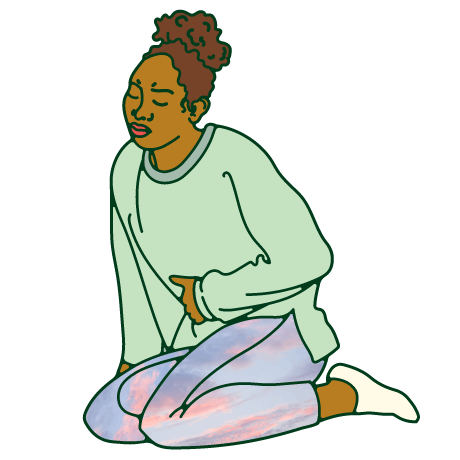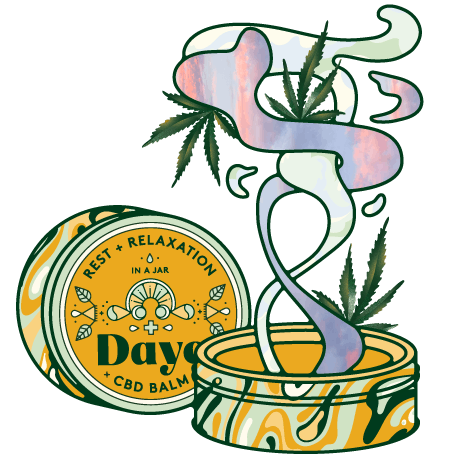Table of contents
1. What are period cramps?
2. What is CBD?
3. How can CBD work for period pain?
4. Can CBD ease PMS?
5. How to choose the right CBD product for you?
6. Can CBD help menstrual discomfort?
Illustrated by Sabrina Bezerra, Erin Rommel & Valko Slavov
If you experience painful cramps during your menstrual cycle, then you may be wondering if CBD can help with period pain. The hype surrounding CBD is huge and for good reason; from easing anxiety to promoting quality sleep, early research shows that it could be a great natural alternative to over-the-counter medication.
Researchers from Colorado University have concluded that CBD can reduce anxiety and ease insomnia. There is also some evidence to suggest that it can help control the body’s response to pain and inhibit inflammation. This has led people to believe that CBD can be a great natural alternative for managing physical pain, period cramps, which cause many people huge discomfort and stress.
By familiarising yourself with the plethora of CBD products on the market, from tinctures and edibles to oils and balms, you can find out how this natural health remedy can be administered, and how it can help you work with your cycle, rather than against it.
What are period cramps?
According to the NHS, period cramps are the result of the muscular wall of the womb tightening and contracting. The body does this to expel the lining of the womb during menstruation. Sometimes these pains come in intensive spasms, other times, they can feel dull or continuous. Some people use over-the-counter pain medication to help alleviate the pain caused by cramps, but research from the National Library of Medicine shows that using painkillers long-term can result in negative side effects, including digestive and cardiovascular problems.
“Long-term use of over-the-counter painkillers increases your risk of stomach upset, gastric bleeding, kidney and heart problems,” says GP Dr Hana Patel. “I would advise people not to use over-the-counter painkillers for more than several days continuously and speak to their doctor if they feel they need to use them for longer.”
Not everyone experiences cramping during their cycle but for many, particularly those suffering from conditions such as endometriosis or PMDD, period cramps can feel severely debilitating. Painful, heavy periods or very light bleeding can also be a sign of a bigger issue, so it’s good to check in with your GP if your cycle suddenly changes.

What is CBD?
Most CBD, otherwise known as cannabidiol, originates from two different varieties of the cannabis sativa plant, marijuana and hemp. The CBD industry has seen a huge amount of growth over the last few years, partly because of its affiliation with the wellness sphere. This has led to a huge amount of products flooding the market.
“In recent times, CBD has gained popularity due to the potential therapeutic benefits it may have,” explains GP Dr Semiya Aziz. “CBD interacts with what we call the body's endocannabinoid system (ECS). This is a complex network that regulates various physiological processes in the body, which can influence the perception of pain by interacting with various neurotransmitter systems.”
Unlike THC (tetrahydrocannabinol), the psychoactive compound in cannabis, CBD does not produce a ‘high’ or alter a person's state of mind. This is why it appeals to people seeking pain relief without the mind-altering effects associated with cannabis.
“Clinical studies have shown a link between potential analgesic (pain-relieving) effects and CBD,” says Dr Aziz. “It has also shown promise in managing different types of pain, including neuropathic pain, musculoskeletal pain, migraines, and fibromyalgia, which has contributed to its popularity as a potential alternative treatment option.”
How can CBD work for period pain?
While there is limited research on using CBD for period pain, there are studies that suggest that CBD can influence the body’s response to pain. One 2022 study from the California Institute of Behavioral Neurosciences and Psychology, highlighted that some observational and clinical studies suggest that CBD can be effective at easing chronic pain; however, the study specified that further research was needed for physicians to properly recommend CBD as a form of pain relief.
“CBD is often considered as a more natural and holistic approach to pain relief as opposed to taking opioids or traditional pain medication,” says Dr Aziz. “CBD is also generally considered to have lower risks and fewer side effects compared to traditional pain medication. There are promising results regarding CBD’s role in pain management, however, there is plenty more work that needs to be done in this field before it can be considered as an alternative option for traditional pain relief.
One study conducted by the American Psychological Investigation revealed that using pure CBD isolate to treat heat pain didn’t necessarily reduce the volume of the pain, but it made the pain less acute for some patients.
“CBD's proposed analgesic and anti-inflammatory properties may help alleviate menstrual cramps, which are a common symptom of PMS,” says Abbas Kanani, a pharmacist at Chemist Click Online Pharmacy. “As CBD interacts with the endocannabinoid system, which regulates pain perception, there is reason to believe that it might help reduce pain and inflammation associated with menstrual cramps. However, individual responses to CBD may vary, and more scientific studies are needed to establish its effectiveness.”

Can CBD ease PMS?
“There is limited research regarding the effects of CBD and PMS however, in the few studies that have been carried out, it appears that there may be potential benefits,” says Dr Aziz. “CBD along with other cannabinoids, can modulate the immune response, reducing the inflammatory processes which may help to alleviate symptoms such as bloating and breast tenderness, according to a study published in the journal Frontiers in Immunology in 2019.”
Cramps aren’t the only symptom that we experience during our menstrual cycle. Some people also suffer from nausea, headaches and anxiety too. Emerging research from the British Journal of Pharmacology suggests that CBD can also help to relieve nausea and in some cases, vomiting, because of the way it interacts with serotonin receptors. Nausea, in particular, can be a knock-on effect of period pains, especially if cramps are severe.
“According to another smaller study published in 2020, in the Journal of Clinical Psychopharmacology, CBD can have an impact on mood disorders and hormonal fluctuations that are often associated with PMS and in turn reduce anxiety, improving overall mood,” says Dr Aziz.
How to choose the right CBD product for you?
There are many different ways you can administer CBD, from gummies to capsules and creams, but what product you choose should depend on what you want to use it for. While CBD oils have been shown to provide a higher range of concentrated CBD, Iin a study from the European Journal of Pain, it was found that transdermal administration (CBD applied to the skin) had long-lasting therapeutic effects on the body and that CBD gel significantly reduced joint swelling. Further research shows that Ttopically applied CBD can be a great way of delivering the benefits of CBD into the body if you want to target specific areas or skin conditions.
CBD is available in various preparations such as oils, topical creams, capsules, suppositories, foods and vapes,” says Dr Aziz. “This versatility allows individuals to choose a CBD product that best suits their needs. Another reason why CBD may be preferred to over-the-counter pain relief is that it is perceived as a more natural and holistic approach to pain relief as opposed to taking opioids or traditional pain medication. Some people are naturally drawn towards alternative therapies which are plant-based and have fewer synthetic or pharmaceutical elements.”
In the past, the CBD industry has been difficult to regulate, so it’s crucial that you do your research and purchase from reputable brands. Studies show that unregulated CBD is unreliable and unsafe, so it’s important that your chosen product is in line with THC regulations (the main psychoactive compound in marijuana) in CBD products. In the UK, it has to legally have to be lower than 0.2%.
“Products made from organically grown hemp may have a lower risk of exposure to pesticides, herbicides, and other harmful chemicals,” says Kanani. “Ideally, the hemp should be sourced from reputable farms with strict regulations on cultivation practices. You should look for CBD brands that provide transparent information about their sourcing, manufacturing processes, and ingredients.”

Can CBD help menstrual discomfort?
Although there is limited evidence regarding how effective CBD is for relieving menstrual pain, emerging research on the benefits of CBD is very promising. So far, this natural remedy has been shown to have some effective, anti-inflammatory, mood-stabilising and muscle relaxant properties, according to several different studies.
“More research is needed to fully understand the potential beneficial effects of CBD on PMS,” says Dr Aziz. “It is also important to note that the individual experiences of using CBD can vary from person to person, and other factors such as lifestyle changes, diet, exercise and stress management may all play an important part in the overall effect on PMS.”
If you’re experiencing severe discomfort during your menstrual cycle, then your first point of call should always be your GP. However, that’s not to say that natural remedies, like CBD, can’t be a worthwhile alternative to helping ease symptoms commonly associated with PMS, such as anxiety, nausea and bloating. CBD’s interactions with the endocannabinoid system, which regulates pain perception, may help reduce pain and inflammation associated with menstrual cramps, but the majority of experts agree that more research is needed in this area. The most important thing you can do before introducing CBD into your routine is to make sure that your product complies with CBD regulations and comes from a reputable brand, that uses quality hemp in its products.






